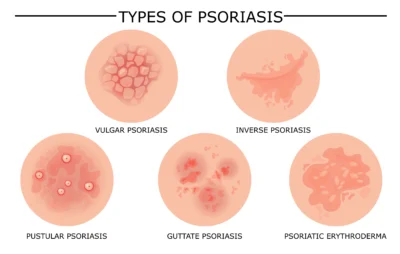Understanding Psoriasis: A Comprehensive Guide to Causes, Treatment, and Management in Pakistan
Psoriasis affects approximately 125 millions of people worldwide that makes 2 to 3% of world’s population, including a significant number of individuals in Pakistan. This chronic skin condition, characterized by red, scaly patches and plaques on the skin, can dramatically impact quality of life if not properly understood and managed. Let’s explore this condition thoroughly, examining its causes, symptoms, treatment options, and practical management strategies specifically relevant to those living in Pakistan.
What is Psoriasis?
Psoriasis is a chronic autoimmune skin condition that accelerates the life cycle of skin cells, causing them to build up rapidly on the surface of the skin. Under normal circumstances, skin cells take about 28 days to mature and shed. In psoriasis, this process occurs in just 3-7 days, leading to the characteristic thick, silvery scales and itchy, dry, red patches that can be painful.
Think of psoriasis as your immune system mistakenly pressing the “fast forward” button on skin cell production. Instead of skin cells developing at a normal pace and shedding invisibly, they pile up on the surface like cars in a traffic jam, creating the visible symptoms we associate with this condition.
The condition is not contagious, meaning you cannot catch it from someone else through physical contact, sharing personal items, or being in close proximity. This is a crucial point that helps dispel common misconceptions that unfortunately still persist in many communities, including Pakistan.
Understanding the Root Causes of Psoriasis
Psoriasis develops through a complex interplay of genetic predisposition and environmental triggers. Understanding these underlying causes helps us appreciate why the condition affects some people and not others, and why symptoms can vary so dramatically between individuals.
Genetic Factors
Research shows that psoriasis has a strong hereditary component. If one parent has psoriasis, there’s approximately a 10% chance their child will develop the condition. When both parents have psoriasis, this probability increases to about 50%. However, having the genetic predisposition doesn’t guarantee you’ll develop psoriasis – it simply means you’re more susceptible to triggers that could activate the condition.
Scientists have identified multiple genes associated with psoriasis, with the HLA-Cw6 gene being one of the most significant. This gene affects how the immune system functions, particularly how it recognizes and responds to perceived threats.
Immune System Dysfunction
At its core, psoriasis is an autoimmune condition. Your immune system, which normally protects you from infections and diseases, mistakenly identifies healthy skin cells as foreign invaders. This triggers an inflammatory response that speeds up skin cell production and creates the characteristic symptoms.
Specifically, T-lymphocytes (a type of white blood cell) become overactive and release inflammatory substances called cytokines. These cytokines signal skin cells to reproduce rapidly while also causing the inflammation and redness associated with psoriatic lesions.
Environmental Triggers
Various environmental factors can trigger psoriasis in genetically susceptible individuals or worsen existing symptoms. Understanding these triggers is particularly important for management and prevention strategies.
Stress plays a significant role in psoriasis development and flare-ups. The connection between psychological stress and psoriasis is well-documented, with many patients reporting their first outbreak or significant worsening during periods of high stress. This is particularly relevant in Pakistan, where social and economic pressures can be substantial.
Infections can trigger psoriasis, especially streptococcal throat infections. This is why guttate psoriasis (characterized by small, drop-like lesions) often appears in children and young adults following a throat infection.
Medications such as beta-blockers, antimalarials, and lithium can trigger or worsen psoriasis. If you’re taking any medications and notice skin changes, consult your healthcare provider.
Weather conditions significantly impact psoriasis. Cold, dry weather typically worsens symptoms, while warm, sunny climates often provide relief. This is relevant for people in Pakistan, where dramatic seasonal changes can affect symptom severity.
Recognizing Different Types of Psoriasis
Psoriasis manifests in several distinct forms, each with unique characteristics and treatment considerations. Understanding these variations helps in proper identification and management.
Plaque Psoriasis (Psoriasis Vulgaris)
This is the most common form, affecting about 80% of people with psoriasis. Plaque psoriasis appears as raised, red patches and plaques covered with silvery-white scales. These plaques typically develop on the elbows, knees, scalp, and lower back, though they can appear anywhere on the body.
The patches often have well-defined borders and can vary in size from small spots to large areas covering significant portions of the body. The scales are created by the rapid accumulation of skin cells and can be quite thick.
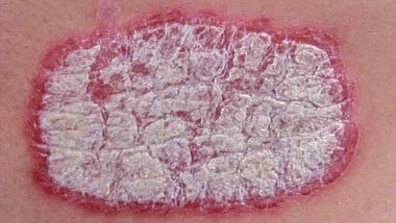
Guttate Psoriasis
This form appears as small, drop-shaped lesions scattered across the trunk, arms, and legs. Guttate psoriasis often develops suddenly following a bacterial infection, particularly strep throat. It’s more common in children and young adults and may resolve on its own or progress to plaque psoriasis.
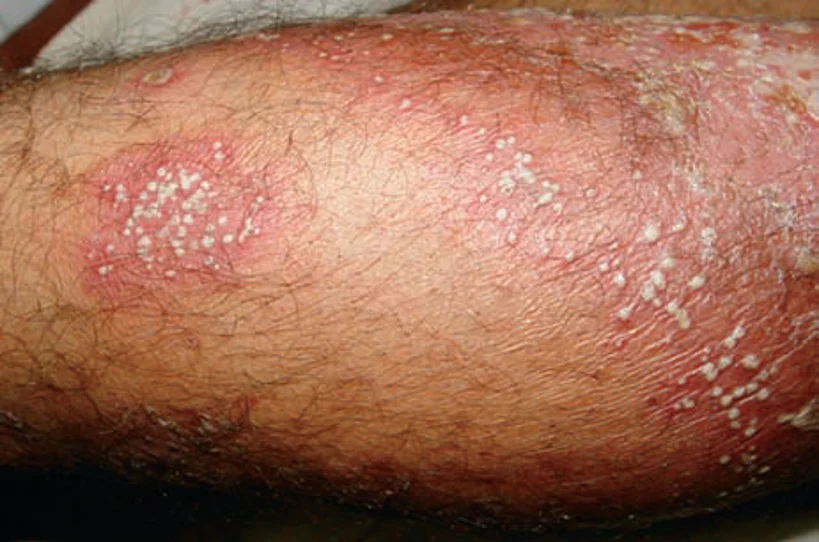
Pustular Psoriasis
Characterized by white pustules surrounded by red skin, this form can be localized to specific areas like the hands and feet or generalized across the body. Despite their appearance, these pustules are not infectious and contain white blood cells rather than bacteria.
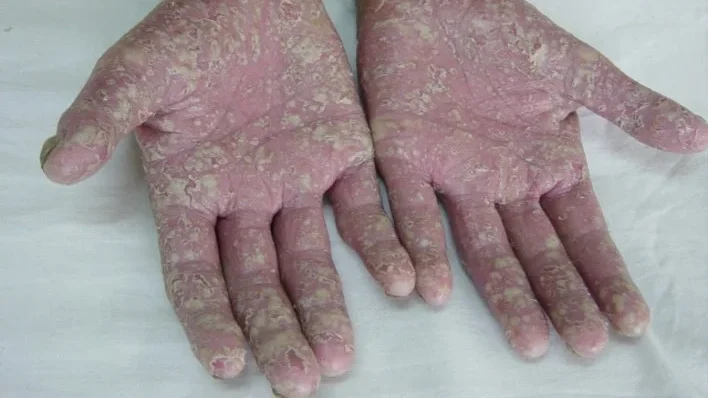
Erythrodermic Psoriasis
This is the least common but most severe form, affecting more than 90% of the body surface. It appears as widespread redness and scaling that can be life-threatening due to the body’s inability to regulate temperature and maintain proper fluid balance.
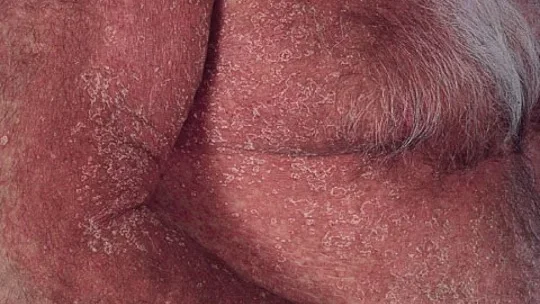
Arthropathic Psoriasis (Psoriatic Arthritis)
This form combines skin symptoms with joint inflammation, affecting approximately 7-40% of people with psoriasis. It can cause permanent joint damage if left untreated, making early recognition and treatment crucial.
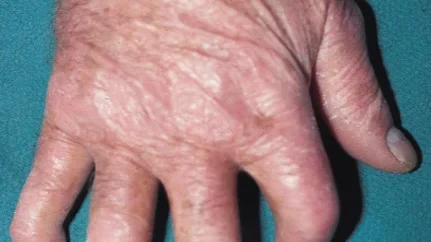
Nail Psoriasis
- Prevalence: Affects 25-50% of psoriasis patients
- Symptoms:
- Nail pitting (small depressions)
- Nail thickening and discoloration
- Onycholysis (nail separation from nail bed)
- Subungual hyperkeratosis (buildup under nails)
- Oil drop sign (yellow-brown spots)
- Impact: Can affect both fingernails and toenails
- Associated Risk: 80% of patients with nail psoriasis develop psoriatic arthritis
Comprehensive Treatment Approaches
Effective psoriasis treatment requires a multifaceted approach tailored to the individual’s specific type, severity, and lifestyle factors. Treatment strategies generally fall into three categories: topical treatments, systemic therapies, and phototherapy.
Topical Treatments
Topical treatments are applied directly to the skin and represent the first line of defense for mild to moderate psoriasis. These treatments work through various mechanisms to reduce inflammation, slow cell production, and remove scales.
Topical Corticosteroids are among the most commonly prescribed treatments. They reduce inflammation and suppress the immune response in affected areas. Different potencies are available, from mild formulations suitable for sensitive areas like the face to stronger preparations for thick plaques on elbows and knees.
Vitamin D Analogues such as calcipotriene work by slowing skin cell growth and reducing inflammation. These can be particularly effective when combined with topical corticosteroids and are often well-tolerated for long-term use.
Tar Preparations have been used for psoriasis treatment for over a century. Coal tar helps slow skin cell growth and reduce inflammation, though it can be messy and has a strong odor.
Topical Retinoids derived from vitamin A help normalize skin cell production and reduce inflammation. They’re particularly useful for maintaining remission after other treatments have cleared lesions.
Keratolytics such as salicylic acid help remove scales and allow other medications to penetrate more effectively. They’re particularly useful for thick, scaly lesions.
Systemic Treatments
For moderate to severe psoriasis that doesn’t respond adequately to topical treatments, systemic therapies may be necessary. These medications work throughout the body to suppress the immune system or interfere with specific inflammatory pathways.
Methotrexate is a well-established systemic treatment that suppresses the immune system. It’s typically taken once weekly and requires regular monitoring of liver function and blood counts. The usual dose ranges from 7.5 to 30 mg per week.
Retinoids such as acitretin help normalize skin cell production. The typical dose is 0.5-1 mg per kilogram of body weight daily. These medications can be particularly effective for pustular and erythrodermic psoriasis.
Cyclosporin is a powerful immunosuppressant that can provide rapid improvement. It’s typically used for short-term treatment due to potential side effects, with doses ranging from 2.5 to 5 mg per kilogram daily.
Biologic therapies represent the newest class of psoriasis treatments. These medications target specific components of the immune system involved in psoriasis development. While highly effective, they’re also expensive and may not be readily available in all areas of Pakistan.
Treat Psoriasis with Products Available at Derma.pk
Keratolytics – Scale Removal Specialists
Keratolytic agents help remove thick scales and allow other medications to penetrate more effectively.
PHARMACERIS ICHTILIX FORTE Keratolytic Liquid (125ml)
- Origin: Imported from Poland
- Function: Intensive exfoliation for thick psoriatic scales
- Active Ingredients: Urea and salicylic acid combination
- Application: Apply to affected areas, allow penetration before other treatments
- Benefits: Softens and removes scales, enhances medication absorption
- Usage: Once daily on affected areas
Urea-Based Creams
- Concentration: 10-40% urea for psoriasis
- Mechanism: Hydrates and softens thick skin
- Benefits: Reduces scaling, improves skin texture
- Best for: Thick plaques on elbows, knees, and feet
Salicylic Acid Preparations
- Concentration: 2-6% for psoriasis
- Function: Removes scales, reduces thickness
- Application: Apply thin layer to plaques
- Precaution: Avoid large areas due to absorption risk
Moisturizers – Barrier Protection & Hydration
Proper moisturizing is fundamental to psoriasis management, helping maintain skin barrier function.
Intensive Moisturizing Creams
- Ceramide-based formulations: Restore skin barrier
- Glycerin-rich products: Attract and retain moisture
- Petroleum-based ointments: Maximum occlusion for severe dryness
- Application: Multiple times daily, especially after bathing
Recommended Moisturizer Features:
- Fragrance-free formulations
- Hypoallergenic ingredients
- Thick consistency for better occlusion
- Non-comedogenic properties
Vitamin D Analogues – Targeted Psoriasis Treatment
CALPSOR B Creamy Lotion
- Active Ingredient: Calcipotriol (Vitamin D3 analogue)
- Mechanism: Slows skin cell production, reduces inflammation
- Application: Twice daily to affected areas
- Benefits:
- Effective for plaque psoriasis
- Safe for long-term use
- Can be combined with topical steroids
- Coverage: Suitable for body psoriasis (avoid face)
- Results: Improvement typically seen in 2-4 weeks
Calcipotriol Benefits:
- Normalizes skin cell differentiation
- Anti-inflammatory properties
- Minimal systemic absorption
- Suitable for maintenance therapy
Specialized Shampoos – Scalp Psoriasis Solutions
Scalp psoriasis requires specialized care due to hair coverage and sensitive scalp skin.
PHOTONIC TAR Shampoo
- Active Ingredient: Coal tar extract
- Mechanism: Anti-inflammatory, antiproliferative
- Benefits:
- Reduces scaling and inflammation
- Slows skin cell production
- Long-established efficacy
- Usage: 2-3 times weekly, leave on scalp for 5 minutes
- Note: May cause temporary odor and staining
CONAZ Antifungal Shampoo
- Active Ingredient: Ketoconazole
- Function: Antifungal and anti-inflammatory
- Benefits:
- Treats secondary fungal infections
- Reduces scalp inflammation
- Controls seborrheic component
- Application: Twice weekly, massage into scalp
- Duration: Leave on for 3-5 minutes before rinsing
BIO SEL Shampoo (100ml)
Advantage: Less irritating than tar-based shampoos
Target: Scalp psoriasis, dandruff, seborrheic conditions
Formulation: Gentle yet effective for regular use
Benefits:
Suitable for sensitive scalps
Reduces itching and flaking
Can be used more frequently
Usage: 2-3 times weekly, gentle massage application
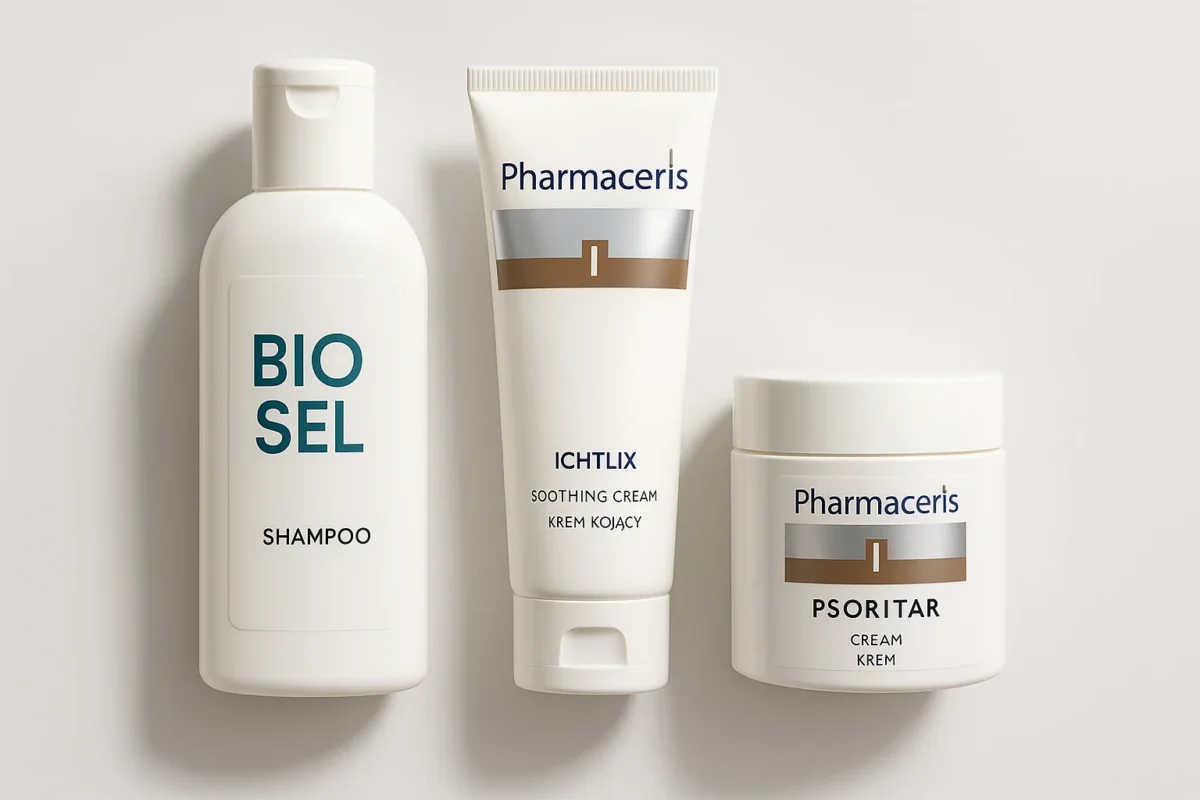
Practical Management Strategies
Successful psoriasis management extends beyond medical treatments to include lifestyle modifications and self-care practices that can significantly impact symptom severity and quality of life.
Skin Care Fundamentals
Maintaining proper skin hydration is crucial for psoriasis management. Regular use of moisturizers helps prevent cracking and reduces itching. Choose fragrance-free, hypoallergenic products and apply them immediately after bathing while the skin is still damp to lock in moisture.
Gentle bathing practices can provide significant relief. Add colloidal oatmeal, Epsom salts, or Dead Sea salts to lukewarm baths to help remove scales and soothe inflammation. Avoid hot water and harsh soaps, which can irritate already sensitive skin.
Stress Management
Given the strong connection between stress and psoriasis flare-ups, developing effective stress management techniques is essential. This might include regular exercise, meditation, yoga, or simply ensuring adequate sleep. In Pakistan’s often stressful social and economic environment, finding healthy outlets for stress is particularly important.
Dietary Considerations
While there’s no specific “psoriasis diet,” some dietary modifications may help reduce inflammation and improve overall health. Consider reducing intake of processed foods, excessive sugar, and alcohol while increasing consumption of omega-3 fatty acids found in fish, anti-inflammatory spices like turmeric (readily available in Pakistani cuisine), and plenty of fruits and vegetables.
Climate Considerations
Pakistan’s diverse climate zones present both challenges and opportunities for psoriasis management. The dry, cold winters in northern regions may worsen symptoms, while the humid coastal areas might provide some relief. During harsh weather periods, pay extra attention to moisturizing and consider using a humidifier indoors.
When to Seek Professional Help
While mild psoriasis can often be managed with over-the-counter treatments and lifestyle modifications, certain situations warrant professional medical attention. Seek immediate care if you experience signs of infection (increased warmth, pus, red streaking from lesions), if your psoriasis covers a large percentage of your body, or if joint pain accompanies your skin symptoms.
Regular dermatological care is important for monitoring treatment effectiveness and adjusting therapies as needed. In Pakistan, dermatologists are available in major cities, and many now offer telemedicine consultations for follow-up care.
If psoriasis significantly impacts your mental health, causing depression, anxiety, or social withdrawal, don’t hesitate to seek psychological support alongside dermatological care. The psychological impact of chronic skin conditions is real and treatable.
Living Successfully with Psoriasis
Psoriasis is a chronic condition, meaning it requires long-term management rather than a cure. However, with proper treatment and lifestyle adjustments, most people with psoriasis can achieve good control of their symptoms and maintain an excellent quality of life.
Understanding that psoriasis follows a pattern of flare-ups and remissions helps set realistic expectations. Some periods may require more intensive treatment, while others may involve primarily maintenance therapy. The key is developing a flexible management plan that can be adjusted based on current symptoms and life circumstances.
Building a support network is invaluable. This might include family members who understand the condition, healthcare providers who specialize in psoriasis care, or support groups where you can connect with others facing similar challenges.
Remember that psoriasis is not contagious, not a reflection of poor hygiene, and not something you caused. These facts are particularly important to remember in social situations where misconceptions about skin conditions persist.
Prevention and Long-term Outlook
While psoriasis cannot be prevented in genetically susceptible individuals, understanding and avoiding personal triggers can significantly reduce the frequency and severity of flare-ups. Keep a symptom diary to identify patterns between potential triggers and symptom worsening.
The long-term outlook for psoriasis has improved dramatically with advances in treatment options. New medications continue to be developed, and our understanding of the condition’s underlying mechanisms continues to expand. Many people with psoriasis live full, active lives with minimal impact from their condition.
For those in Pakistan, access to effective treatments continues to improve, with both local and imported options becoming more readily available. Online platforms like derma.pk make specialized treatments more accessible to people throughout the country.
Conclusion
Psoriasis, while challenging, is a manageable condition when approached with the right knowledge, treatments, and support systems. Understanding the underlying causes helps demystify the condition and reduces stigma, while comprehensive treatment approaches offer hope for symptom control and improved quality of life.
The key to successful psoriasis management lies in working closely with healthcare providers to develop a personalized treatment plan, maintaining consistent skin care routines, managing stress effectively, and staying informed about new treatment options as they become available.
Whether you’re dealing with your first psoriasis symptoms or seeking better control of a long-standing condition, remember that effective help is available. With patience, persistence, and the right approach, psoriasis can be managed successfully, allowing you to focus on living your life to the fullest.
For those ready to take action in managing their psoriasis, consider exploring the specialized treatment options available through derma.pk, where you can find quality products specifically formulated for psoriasis care, backed by international standards and delivered conveniently to your location throughout Pakistan.

